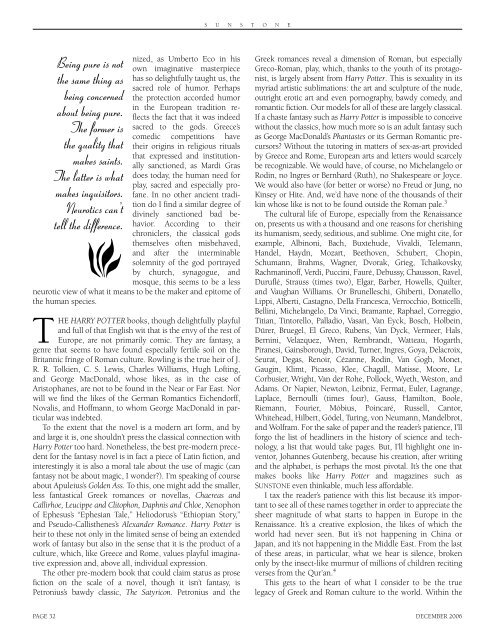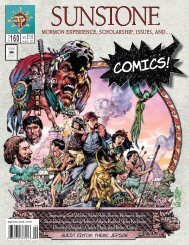Download Entire Issue PDF - Sunstone Magazine
Download Entire Issue PDF - Sunstone Magazine
Download Entire Issue PDF - Sunstone Magazine
Create successful ePaper yourself
Turn your PDF publications into a flip-book with our unique Google optimized e-Paper software.
S U N S T O N E<br />
Being pure is not<br />
the same thing as<br />
being concerned<br />
about being pure.<br />
The former is<br />
the quality that<br />
makes saints.<br />
The latter is what<br />
makes inquisitors.<br />
Neurotics can’t<br />
tell the difference.<br />
nized, as Umberto Eco in his<br />
own imaginative masterpiece<br />
has so delightfully taught us, the<br />
sacred role of humor. Perhaps<br />
the protection accorded humor<br />
in the European tradition reflects<br />
the fact that it was indeed<br />
sacred to the gods. Greece’s<br />
comedic competitions have<br />
their origins in religious rituals<br />
that expressed and institutionally<br />
sanctioned, as Mardi Gras<br />
does today, the human need for<br />
play, sacred and especially profane.<br />
In no other ancient tradition<br />
do I find a similar degree of<br />
divinely sanctioned bad behavior.<br />
According to their<br />
chroniclers, the classical gods<br />
themselves often misbehaved,<br />
and after the interminable<br />
solemnity of the god portrayed<br />
by church, synagogue, and<br />
mosque, this seems to be a less<br />
<br />
neurotic view of what it means to be the maker and epitome of<br />
the human species.<br />
THE HARRY POTTER books, though delightfully playful<br />
and full of that English wit that is the envy of the rest of<br />
Europe, are not primarily comic. They are fantasy, a<br />
genre that seems to have found especially fertile soil on the<br />
Britannic fringe of Roman culture. Rowling is the true heir of J.<br />
R. R. Tolkien, C. S. Lewis, Charles Williams, Hugh Lofting,<br />
and George MacDonald, whose likes, as in the case of<br />
Aristophanes, are not to be found in the Near or Far East. Nor<br />
will we find the likes of the German Romantics Eichendorff,<br />
Novalis, and Hoffmann, to whom George MacDonald in particular<br />
was indebted.<br />
To the extent that the novel is a modern art form, and by<br />
and large it is, one shouldn’t press the classical connection with<br />
Harry Potter too hard. Nonetheless, the best pre-modern precedent<br />
for the fantasy novel is in fact a piece of Latin fiction, and<br />
interestingly it is also a moral tale about the use of magic (can<br />
fantasy not be about magic, I wonder?). I’m speaking of course<br />
about Apuleius’s Golden Ass. To this, one might add the smaller,<br />
less fantastical Greek romances or novellas, Chaereas and<br />
Callirhoe, Leucippe and Clitophon, Daphnis and Chloe, Xenophon<br />
of Ephesus’s “Ephesian Tale,” Heliodorus’s “Ethiopian Story,”<br />
and Pseudo-Callisthenes’s Alexander Romance. Harry Potter is<br />
heir to these not only in the limited sense of being an extended<br />
work of fantasy but also in the sense that it is the product of a<br />
culture, which, like Greece and Rome, values playful imaginative<br />
expression and, above all, individual expression.<br />
The other pre-modern book that could claim status as prose<br />
fiction on the scale of a novel, though it isn’t fantasy, is<br />
Petronius’s bawdy classic, The Satyricon. Petronius and the<br />
Greek romances reveal a dimension of Roman, but especially<br />
Greco-Roman, play, which, thanks to the youth of its protagonist,<br />
is largely absent from Harry Potter. This is sexuality in its<br />
myriad artistic sublimations: the art and sculpture of the nude,<br />
outright erotic art and even pornography, bawdy comedy, and<br />
romantic fiction. Our models for all of these are largely classical.<br />
If a chaste fantasy such as Harry Potter is impossible to conceive<br />
without the classics, how much more so is an adult fantasy such<br />
as George MacDonald’s Phantastes or its German Romantic precursors?<br />
Without the tutoring in matters of sex-as-art provided<br />
by Greece and Rome, European arts and letters would scarcely<br />
be recognizable. We would have, of course, no Michelangelo or<br />
Rodin, no Ingres or Bernhard (Ruth), no Shakespeare or Joyce.<br />
We would also have (for better or worse) no Freud or Jung, no<br />
Kinsey or Hite. And, we’d have none of the thousands of their<br />
kin whose like is not to be found outside the Roman pale. 3<br />
The cultural life of Europe, especially from the Renaissance<br />
on, presents us with a thousand and one reasons for cherishing<br />
its humanism, seedy, seditious, and sublime. One might cite, for<br />
example, Albinoni, Bach, Buxtehude, Vivaldi, Telemann,<br />
Handel, Haydn, Mozart, Beethoven, Schubert, Chopin,<br />
Schumann, Brahms, Wagner, Dvorak, Grieg, Tchaikovsky,<br />
Rachmaninoff, Verdi, Puccini, Fauré, Debussy, Chausson, Ravel,<br />
Duruflé, Strauss (times two), Elgar, Barber, Howells, Quilter,<br />
and Vaughan Williams. Or Brunelleschi, Ghiberti, Donatello,<br />
Lippi, Alberti, Castagno, Della Francesca, Verrocchio, Botticelli,<br />
Bellini, Michelangelo, Da Vinci, Bramante, Raphael, Correggio,<br />
Titian, Tintorello, Palladio, Vasari, Van Eyck, Bosch, Holbein,<br />
Dürer, Bruegel, El Greco, Rubens, Van Dyck, Vermeer, Hals,<br />
Bernini, Velazquez, Wren, Rembrandt, Watteau, Hogarth,<br />
Piranesi, Gainsborough, David, Turner, Ingres, Goya, Delacroix,<br />
Seurat, Degas, Renoir, Cézanne, Rodin, Van Gogh, Monet,<br />
Gaugin, Klimt, Picasso, Klee, Chagall, Matisse, Moore, Le<br />
Corbusier, Wright, Van der Rohe, Pollock, Wyeth, Weston, and<br />
Adams. Or Napier, Newton, Leibniz, Fermat, Euler, Lagrange,<br />
Laplace, Bernoulli (times four), Gauss, Hamilton, Boole,<br />
Riemann, Fourier, Möbius, Poincaré, Russell, Cantor,<br />
Whitehead, Hilbert, Gödel, Turing, von Neumann, Mandelbrot,<br />
and Wolfram. For the sake of paper and the reader’s patience, I’ll<br />
forgo the list of headliners in the history of science and technology,<br />
a list that would take pages. But, I’ll highlight one inventor,<br />
Johannes Gutenberg, because his creation, after writing<br />
and the alphabet, is perhaps the most pivotal. It’s the one that<br />
makes books like Harry Potter and magazines such as<br />
SUNSTONE even thinkable, much less affordable.<br />
I tax the reader’s patience with this list because it’s important<br />
to see all of these names together in order to appreciate the<br />
sheer magnitude of what starts to happen in Europe in the<br />
Renaissance. It’s a creative explosion, the likes of which the<br />
world had never seen. But it’s not happening in China or<br />
Japan, and it’s not happening in the Middle East. From the last<br />
of these areas, in particular, what we hear is silence, broken<br />
only by the insect-like murmur of millions of children reciting<br />
verses from the Qur’an. 4<br />
This gets to the heart of what I consider to be the true<br />
legacy of Greek and Roman culture to the world. Within the<br />
PAGE 32 DECEMBER 2006

















